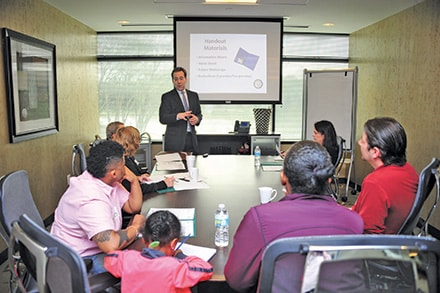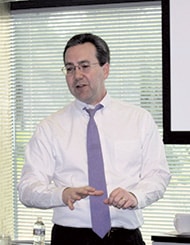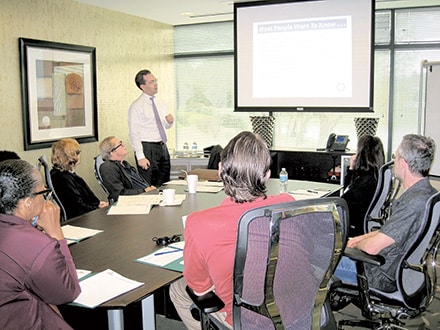

“We do both planning and cleanup,” said James Miskell, J.D., founder of the Estate Planning and Law Group of Georgia, James M. Miskell, P.C. “Believe me, what you want for your family is the planning.” Why? Quite simply, planning provides peace of mind for everyone. Miskell is passionate about the importance of having a plan in place, one that clearly outlines what happens to your assets during a period of temporary disability or one of death. It’s a topic no one wants to jump into as a family, but having such critical discussions spares everyone involved a lot of pain, disagreement and, in many cases, permanent emotional damage to a family. No one wants that, no matter how difficult the conversation.
Miskell is so passionate about the importance of estate planning that he holds as many as 3 workshops every month, open to anyone who wants to learn more about the subject, what the terms mean, and see firsthand some excellent illustrations of all the “what-ifs,” and there are many. “There is no ‘one-size-fits-all’ solution out there, because estate planning decisions are made based as much on your particular family dynamics as they are your assets and wishes,” Miskell said. “People tend to think that estate planning is only for those people who live in mansions and have millions of dollars when in fact, it’s important to anyone who has loved ones.”
In his workshops, Miskell uses thoughtful and creative ways to explain to attendees all the considerations of estate planning. He also addresses common misconceptions, such as ideas about “power of attorney,” which gives a named individual the power to make decisions in the event you are incapacitated. “Did you know that power of attorney expires upon the death of the person who granted it? So if your appointee is put in the position of having to manage your affairs – even pay your bills – he can’t, if power of attorney is all that’s in place,” Miskell advised. And granting power of attorney to a child or anyone else does not mean that the individual has lost her independence. It just means that her affairs can be handled and decisions made during a time when she can’t speak for herself.
“The two things that everyone needs in place on their 18th birthday are Power of Attorney and a Healthcare Directive,” said JoAnn Radtke, Client Services Coordinator for Miskell’s practice. With these two simple assurances in place, so much pain and confusion and outright mistakes can be avoided.

Another important element of these discussions is for parents to share with their children where their important papers are, and where they may store valuables. These talks can, frankly, feel awkward. Children may feel as though they are behaving like vultures, circling Mom and Dad. Parents may feel that they are giving up their independence by having certain directives in place, or even by having these conversations with their children. But the reality, according to Miskell is that “Last time I checked, the mortality rate in the state of Georgia is 100 percent, meaning every family will be faced with these matters. Having a clear plan in place is the most loving thing you can do.”
The workshops, led by attorney Jim Miskell, provide an opportunity for you, and your financial adviser, to learn the answers to commonly asked estate planning questions about wills, trusts, Medicaid planning and other important topics.“We plan for and protect our kids when they’re little; estate planning is no different. It’s just one more expression of the fact that we love our families, that’s all,” said Miskell. And “estate planning,” while it may sound involved and therefore, expensive, for some families is simply having a will in place. For others, more specific directives and contingencies are required.
Miskell is so convinced of the necessity of estate planning that, not only are his valuable workshops offered at no charge, but anyone who has attended one of his workshops receives an initial consultation, also at no charge. “It’s that important that you understand the terminology and principles of estate planning; if you’ve been to one of my workshops, you’re that much ahead of the game,” he said, adding that there is no obligation to use his firm’s services after attending a workshop. He’s just that passionate about the value of education before entering into the planning phase. “The workshops remove both the anxiety and the procrastination because we help people understand the terminology. We help them understand specific scenarios not by throwing out a lot of legal terms, but by using real-life examples and creative visual aids,” Radtke said. In other words, education removes that all-too-familiar veil of mystery, intimidation and confusing “legal-ese” that are often the chief villains that cause procrastination.

